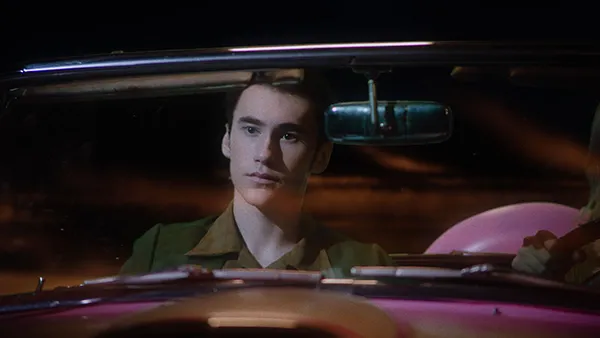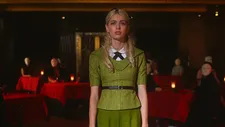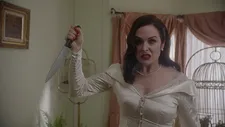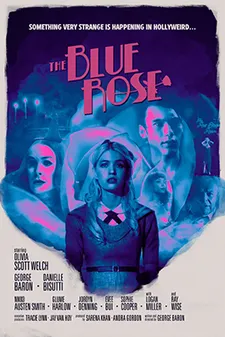 |
| George Baron in The Blue Rose Photo: courtesy of Frightfest |
One of the more unusual films about this year’s Frightfest is that it features two films made by teenagers. Alice Maio Mackay was unfortunately not available to talk about her spiky satire T Blockers, but we will doubtless be seeing more of her work in years to come. George Baron, however, was happy to meet up for a chat about his surrealist detective tale The Blue Rose. He wrote, directed and stars in it, but it’s no amateur effort, being handsomely produced and more than capable of standing alongside the big hitters at the festival.
As the name might suggest, the film is inspired by the work of David Lynch, though there’s a lot more going on than that and Baron is no mere imitator, acquitting himself well. He plays a young detective who, along with colleague Lilly (Olivia Scott Welch), investigates a mysterious murder and disappearance in a world of white picket fences, vast mansions and seedy nightclubs, a film noir setting rendered in soft pastels or deep red. Despite the positive attention he’s been getting, however, I wasn’t surprised when he told me he was terrified by the festival screening – though also very excited. So how did he find himself in this position at a stage in life when most people with film industry ambitions are struggling to make shorts or to get noticed as actors?
“I often find myself asking that,” he says with a shrug. “I moved to Los Angeles when I was pretty young, and almost immediately knew that I didn't just want to do acting. I guess I had always been interested in in filmmaking. I remember in kindergarten, when they asked us what we wanted to be, I said Tim Burton, so I think that was the conception of that. But yeah, I moved to LA and started directing theatre at a very, very young age, and then also doing child acting at the same time. And one of the producers that I had worked with on a film when I was a kid, came and saw a musical that I directed, when I was 14, I think. She came and she saw it and she said ‘I love this, ‘ and so then when the pandemic hit, and I wrote the script for The Blue Rose, I reached out to her, and I was like, ‘Hey, you want to make a movie?’ And then we made a movie, and here we are.”
We discuss his big casting coup: getting Ray Wise on board to play his boss.
 |
| Olivia Scott Welch in The Blue Rose Photo: courtesy of Frightfest |
“Ray was kind of magical in a sense,” he says. “Obviously, that part was written for a cameo of sorts. During the casting process, we had thrown around a couple ideas, and I just always kept going back to Ray. I think his performance in Fire Walk With Me is one of the greatest male performances of all time. Him and Sheryl Lee as Laura Palmer, I think is just the most incredible duo in a film. The power that they bring to those roles is just insane. And so to have him a part of my little movie is crazy. And he really loved the script. And he said yes, and that was pretty cool. I love Ray. He's a really sweet guy.”
I tell him that I think Fire Walk With Me was underappreciated for years and is only now starting to get the attention it deserves – but the Lynchian influence on The Blue Rose suggests a much deeper appreciation of the director’s work.
“I think that I always had these weird, whimsical ideas for stories and scripts, and I would write them when I was younger,” he says. “It's one thing to be a kid writing scripts and people to be like, pat on the head, you know? ‘Yeah, that's very sweet.’ And then another thing to be writing these insane stories that don't make any sense, that are just heavy handed visuals and stuff like that. And so I kind of always felt sort of outcasted by that, and I was like, ‘Okay, there's no market for what for what I want to make’ And then I saw Blue Velvet for the first time and I was like, ‘Oh, I get it now. There are people that make and watch movies like this.’ And so I fell down a rabbit hole of Lynch films.
“The way that he can tell a story was really inspiring to me, because I feel like media and like film and television are saturated with the same sort of formulaic filmmaking. I was really inspired by the way you could tell a story, like the way that he was doing it. So I watched a lot of Lynch movies and watched a lot of noir and a lot of old classic Hollywood films, which I've always been interested in. I've always been interested in the 1950s. That sort of aesthetic.
“I wasn't setting out to make a David Lynch movie, it just wound up being very reminiscent of that. My concept with it was that the first 45 minutes or hour has a classic noir detective story vibe, with little horror elements sprinkled throughout it, and then once we go into that dream world, we go full in. It's almost baiting the audience a little bit. It's like, here's the first half of this visually very strange film. There’s enough to digest and then once you're in it, then you're in it.
 |
| Danielle Bisutti in The Blue Rose Photo: courtesy of Frightfest |
“I remember when we were doing test screenings for the film, I was really worried that the feedback we would get would be on the more surrealist, avant garde stuff that happens in the movie that doesn't really ‘make any sense’. But nobody said anything about it. They just accepted that that's what it was. And that was like music to my ears. It was all the other things people were talking about, the normal parts. They wanted more more weird stuff, and so that was really nice to hear, to feel validated.”
I venture that between the title and the publicity that it's getting, it’s likely to attract viewers who know what they're getting into. But was it the visual ideas that came first, with a narrative then devised to string them together, or was it the other way around?
“My writing process is very strange,” he says. “I am very location based. For some reason, when I was writing The Blue Rose, it was partly inspired by this artwork that a friend of mine did, this immersive art installation that we made together, but also it was inspired by these really iconic locations in LA. I had written out a list of locations and I was like, ‘How do I make a movie connecting all of these locations together?’ So it wrote itself in a way, because I had all of the places I wanted to shoot.”
I ask about how Olivia came on board, noting that I recently saw her work in Jenn Wexler’s The Sacrifice Game and I’m impressed by her range.
“We had several different people we were looking at for that part,” he says. “We had narrowed it down to two people, and one side wanted one person and the other side wanted the other person. And then we were like, ‘Wait, Olivia Welch has all of the characteristics from this one actor and this other actor. Let's do her.’ She read the script – she read it in her bathtub for the first time, which I think is really ironic, considering what happens in the film. We met, and she and I worked on building Dalton and Lilly's dynamic together. And yeah, it was fun. I had a great time. I hope she had a great time.”
The other thing that really makes the film stand out is its production design.
“I was very, very closely involved with production design – probably more so than I should have been.” He laughs. “I might have neglected some other departments that probably needed my focus a little bit more. But for me, that the colour scheme and the locations and the visual aspect of it, like the scene setting, that was what the film was to me. We had a lovely production designer, Arae Webner, and we worked very closely together. I told her exactly what I wanted, and she made it happen. And, yeah, it was great. The production design, I think, is really special on this film.
 |
| The Blue Rose poster Photo: courtesy of Frightfest |
“We shot this movie in four weeks, so that's not a lot of time at all. It’s kind of unheard of for the amount of locations that we did, and also the size of our film. It was really crazy, but I feel like I was running on so much adrenaline that I had tunnel vision in that I was just like, ‘Get it done. Get it done. Get it done.’ But yeah, we had a month or so of pre production. Everybody knew exactly what they were doing on the project. Everybody had a very clear understanding of what the film was, and so I think everybody respected that and there wasn't a ton of experimentation. Everybody knew what we were coming to make.”
So does he know what he’ll be making next?
“I have this script that I'm almost done with,” he says. “It's in a similar world to Blue Rose but, I would say, much more grounded in reality, and it also takes place in a totally different part of the world. Like Burbank, Hollywood, California, whatever the opposite of that would be. So yeah, I'm working on it. I'd really like to make it – the end of 2024 would be ideal.”
Is this what he wants to do with the rest of his life, making films?
“No!” he declares. “I want to be a Disney theme park Imagineer. I want to be on Broadway. I want to do as many things as I can do. The next thing that I really would like to do is, I would love to act in something that I have no creative input in, like, I'm just there to act. But yeah, I don't know. I've got time.”





















